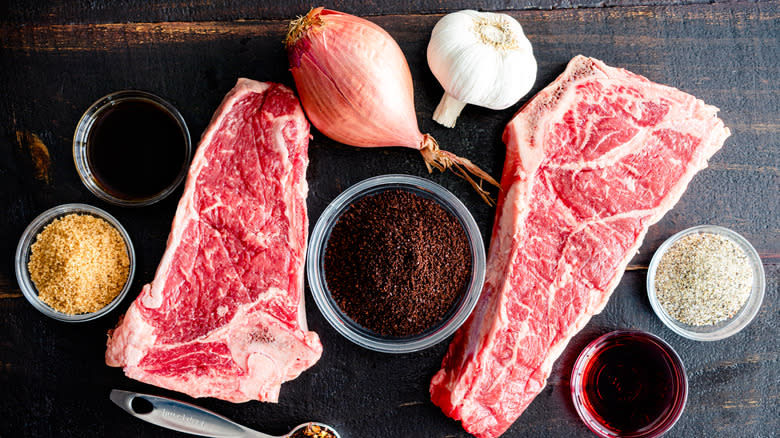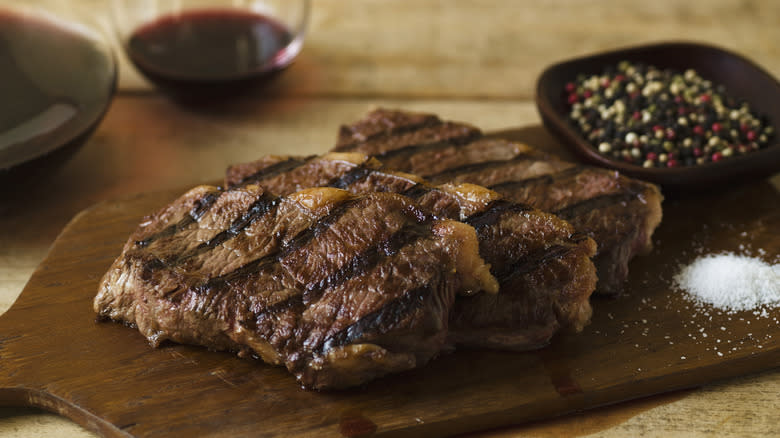Give Your Steak A Coffee Rub And Thank Us Later

When it comes to unconventional steak seasonings, coffee may rank at the top of the list. One wouldn't usually equate that morning cup of joe with being the secret ingredient to those backyard cookouts. But if you want flavorful and tender steaks, use a scoop of ground coffee for good measure. When used in moderation with other ingredients, coffee makes an excellent rub for sirloins and ribeyes. When you take away the creamer and sugar, coffee has a bitter, musky taste that adds depth to steak. In fact, coffee pairs well with a variety of meats, including beef, pork, and poultry.
With steaks, you want to use coffee in moderation. If you use too much coffee, it can give your meat a bitter taste.
Combine the coffee grounds with other ingredients, such as salt, paprika, and garlic powder, for a more balanced rub. (Anyone who's enjoyed coffee with cinnamon or nutmeg knows that coffee blends well with other spices.) That's true even when it's in a ground state instead of a liquid one. It can also improve the quality of the steak.
Read more: The 13 Best Steaks For Grilling
A Coffee Rub Can Act As A Tenderizer

Despite what grill masters may hope, not every piece of steak is going to be tender. Fortunately, coffee acts as a natural tenderizer, making for a juicy, soft-to-chew cut of meat. So, feel free to put away that mallet.
While some may choose to coat their steaks in salt as a tenderizer, you can substitute coffee for the same effect without the additional sodium. Coffee tenderizes the meat by breaking down the fibers in the protein. In particular, it's useful for steaks with fatty tissues or pieces of gristle that may be tougher to chew. This should lead to a more tender steak as a result.
Tenderizing the steak is also a great way to lock in flavor, making for a juicier final product. Given the acidic nature of coffee, it should work in a similar capacity as wine would. The acidity of coffee is similar to the tannins found in vintages, meaning that coffee can similarly unlock the flavor of the meat, enhancing its natural savoriness. While the method may be unconventional, the results speak for themselves (assuming that you don't make any blunders along the way).
Sear The Steak To Lock In Flavor

If you're making a steak rub with coffee grounds and salt, avoid letting it sit for too long. As a dehydrator, salt can make a ribeye or sirloin lose its natural juices, which could lead to a tougher dryer piece of steak. When cooking, you should aim to get a good sear on both sides to lock in flavor. (Don't worry about burning the steak, as the coating from the coffee grounds should provide some protection and lead to a nice crunchy crust.)
Prior to cooking, you should consider which roast you're going to use. Generally, darker roasts have a more bitter, earthy taste that could potentially overwhelm the flavors of the meat. If it's your first time making a coffee rub, you may want to go with a lighter roast instead. Lighter roasts are generally sweeter and less musky than darker varieties.
When deciding the beans' grind level, opt for a medium approach. Fine coffee grounds may cling too much to the steak, while coarse grounds may have the opposite problem. As with anything, experiment and figure out what works best for you.
Read the original article on Daily Meal.

